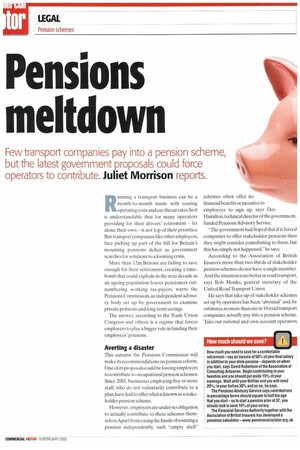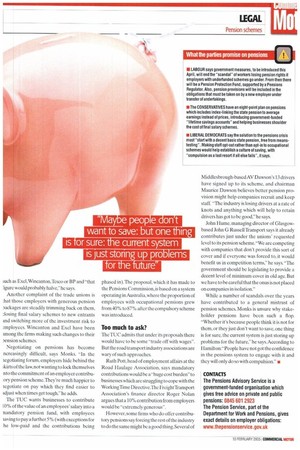Pensions meltdown
Page 34

Page 35

If you've noticed an error in this article please click here to report it so we can fix it.
Few transport companies pay into a pension scheme,
but the latest government proposals could force operators to contribute Juliet Morrison reports.
Running a transport business can be a month-to-month tussle with soaring operating costs and cut-throat rates. So it is understandable that for many operators providing for their drivers' retirement — let alone their own — is not top of their priorities. But transport companies, like other employers, face picking up part of the bill for Britain's mounting pensions deficit as government searches for solutions to a looming crisis.
More than 12m Britons are failing to save enough for their retirement, creating a timebomb that could explode in the next decade as an ageing population leaves pensioners outnumbering working tax-payers. warns the Pensions Commission, an independent advisory body set up by government to examine private pensions and long-term savings.
The answer, according to the Trade Union Congress and others, is a regime that forces employers to play a bigger role in funding their employees' pensions.
Averting a disaster
This autumn the Pensions Commission will make its recommendations on pension reform. One of its proposals could be forcing employers to contribute to occupational pension schemes. Since 2001, businesses employing five or more staff, who do not voluntarily contribute to a plan, have had to offer what is known as a stakeholder pension scheme.
However, employers are under no obligation to actually contribute to these schemes themselves.Apart from easing the hassle of sourcing a pension independently, such "empty shell" schemes often offer no financial benefits or incentive to employees to sign up. says Des Hamilton. technical director of the governmentfunded Pensions Advisory Service.
"The government had hoped that if it forced companies to offer stakeholder pensions then they might consider contributing to them, but this has simply not happened," he says.
According to the Association of British Insurers, more than two-thirds of stakeholder pension schemes do not have a single member. And the situation is no better in road transport, says Bob Monks, general secretary of the United Road Transport Union.
He says that take-up of stakeholder schemes set up by operators has been "abysmal" and, he estimates, no more than one in 10 road transport companies actually pay into a pension scheme. Take out national and own-account operators such as Exel,Wincanton,Tesco or BP and "that igure would probably halve," he says.
Another complaint of the trade unions is that those employers with generous pension )ackages are steadily trimming back on them, closing final salary schemes to new entrants ind switching more of the investment risk to .mployees. Wincanton and Exel have been imong the firms making such changes to their )ension schemes.
Negotiating on pensions has become ncreasingly difficult, says Monks. "In the legotiating forum, employers hide behind the skirts of the law, not wanting to lock themselves nto the commitment of an employer contribu:ory pension scheme. They're much happier to legotiate on pay which they find easier to idjust when times get tough," he adds.
The TUC wants businesses to contribute 10% of the value of an employees' salary into a nandatory pension fund, with employees laving to pay a further 5% (with exceptions for he low-paid and the contributions being phased in). The proposal. which it has made to the Pensions Commission, is based on a system operating in Australia, where the proportion of employees with occupational pensions grew from 40% to 87% after the compulsory scheme was introduced.
Too much to ask?
The TUC admits that under its proposals there would have to be some "trade off with wages". But the road transport industry associations are wary of such approaches.
Ruth Pott, head of employment affairs at the Road Haulage Association, says mandatory contributions would be a -huge cost burden" to businesses which are struggling to cope with the WorkingTime Directive.The Freight Transport Association's finance director Roger Nolan argues that a 10% contribution from employers would be -extremely generous-.
However, some firms who do offer contributory pensions say forcing the rest of the industry to do the same might be a good thing. Several of Middlesbrough-based AV Dawson's 13 drivers have signed up to its scheme, and chairman Maurice Dawson believes better pension provision might help companies recruit and keep staff. "The industry is losing drivers at a rate of knots and anything which will help to retain drivers has got to be good," he says.
John Hume, managing director of Glasgowbased John G Russell Transport says it already contributes just under the unions' requested level to its pension scheme. "We are competing with companies that don't provide this sort of cover and if everyone was forced to, it would benefit us in competition terms," he says. "The government should be legislating to provide a decent level of minimum cover in old age. But we have to be careful that the onus is not placed on companies in isolation."
While a number of scandals over the years have contributed to a general mistrust of pension schemes, Monks is unsure why stakeholder pensions have been such a flop. -Whether it's because people think it is not for them, or they just don't want to save, one thing is for sure, the current system is just storing up problems for the future.he says. According to Hamilton: "People have not got the confidence in the pensions system to engage with it and they will only do so with compulsion." •
CONTACTS
The Pensions Advisory Service is a government-funded organisation which gives tree advice on private and public pensions: 0845 601 2923
The Pension Service, part al the Department for Work and Pensions, gives exact details on employer obligations: www.thepensionservice.gov.uk






































































































































































































